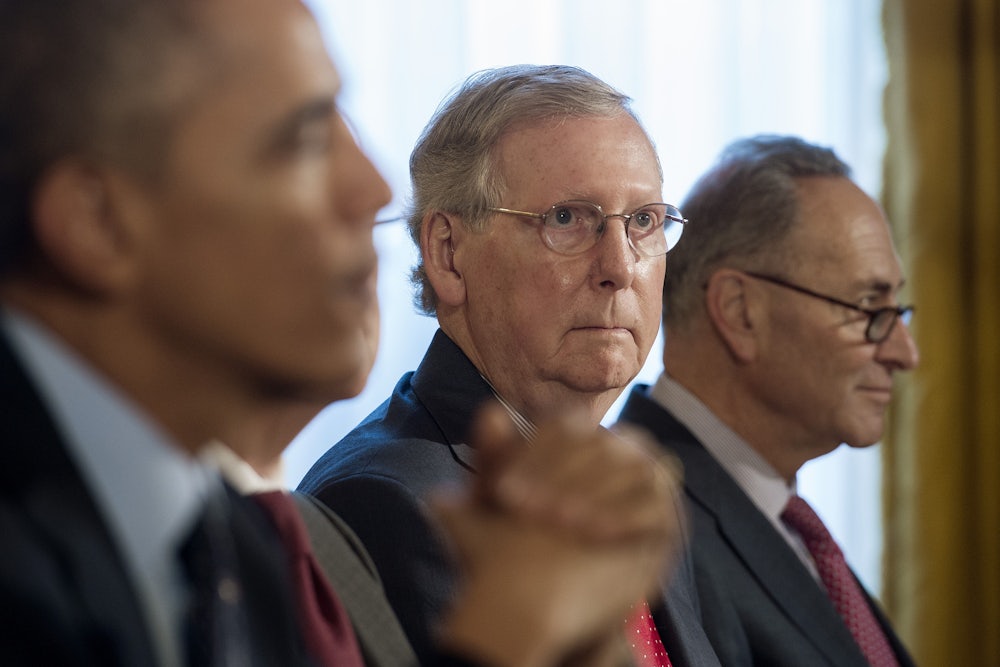One of the most revealing things about American politics, and of the journalists who cover it for a living, is the unspoken assumption that Democrats will rescue Republicans, and thus the country, from the reckless way they have treated the statutory debt limit since 2011. If this assumption is correct (and it almost certainly is) then it demonstrates a profound asymmetry between the parties, as well as an awareness on the part of the political media, which often treats the two parties symmetrically, that something is dangerously dysfunctional about one of them.
This conventional wisdom, which I mostly share, will be tested in September, when Congress has to increase the debt limit or plunge the country into an economic crisis.
Though Republicans control the House of Representatives and the Senate, many of them will refuse to increase the debt limit without accompanying policy ransoms, meaning Democrats will be expected to provide the decisive votes. And this is the best-case scenario. Until recently, cabinet officials in Donald Trump’s administration disagreed with one another over whether the president should side with the hostage-takers or the more responsible faction. They are fortunately all on the same page now—
WH budget chief Mulvaney says he & entire administration now on board behind "clean" debt limit increase - no longer seeking spending cuts
— John Harwood (@JohnJHarwood) August 3, 2017
—but we can’t dismiss the possibility that Trump will do something erratic, like refuse to sign any bills until Republicans pass a health care repeal bill. Democrats, in other words, might have to vote not in modest numbers, but in overwhelming ones, to make a clean debt limit increase veto-proof.
In either case, though, I’d like to challenge the unstated supposition that Democrats will and should provide these votes without reciprocation. It would be hypocritical and destabilizing for Democrats to demand policy concessions from Republicans in exchange for their votes, but that doesn’t mean Democrats have to play themselves by voting for whatever kind of debt limit increase Republicans propose.
Once Congress increases the debt limit, a precedent will be established that it is a weapon that Republicans are allowed to brandish against Democrats. It might be unprincipled for Democrats to equalize this double standard by taking the debt limit hostage the way Republicans did during the Obama years, but there’s no principle that says the Democrats must resign themselves to Republican extremism in perpetuity.
Democrats must insist on de-weaponizing the debt limit as a condition of raising it for a Republican president—and ideally do so when Congress returns from August recess, but at the very least before the end of Trump’s first term. In a rational world, Congress would respond to such a reasonable demand by abolishing the debt limit outright, and on a bipartisan basis, but the strange conventions of legislative politics make that outcome extremely unlikely.
Fortunately, there are creative ways around this conundrum.
Democrats can, for instance, demand that Congress turn the debt limit into something the president can increase unilaterally, subject to congressional reversal. Under such a regime, the debt limit would be rendered harmless, unless a president was determined to sabotage himself or a veto-proof majority in Congress decided that, for whatever reason, the debt limit shouldn’t be increased. Raising it would be a formality, occasioned by a bland statement to Congress and impotent grumbling by members of the opposing party.
Failing that, Democrats could insist on a decades-long debt limit increase, in the hope that Congresses well into the future won’t be populated by so many dangerous reactionaries.
One way or another, though, Democrats shouldn’t accept a state of affairs in which the debt limit is an extortion tool that Republicans can wield at them when they’re out of power. But if Democrats quietly help Republicans increase the debt limit as many times as needed to get through this period of Republican rule, that’s exactly what they’ll be submitting to.
